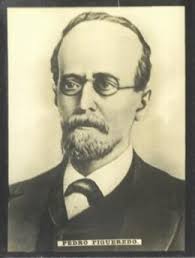
Cuban lawyer and soldier for independence, author of the lyrics and melody of La Bayamesa, a war march that became the Cuban National Anthem. Although his full name was Pedro Felipe Figueredo Cisneros, acquaintances always called him Perucho. Since his birth, on Wednesday, February 18, 1818, his parents Ángel Figueredo and Eulalia Cisneros guaranteed him a rigorous education and exemplary training, but he never stopped being the same simple boy who dazzled Bayamo with talent and seduced it with chivalry.
Like all the Creole elite at the beginning of the 19th century and the main Cuban independentist patricians, he studied first in the capital and later in Spain, places where he achieved notoriety for his artistic-literary skills.
Together with the "Father of the Nation", Carlos Manuel de Céspedes, he was a founder of the Bayamo Philharmonic Society in 1851. Before the revolutionary outbreak of 1868, he had a leading role in various nationalist-inspired literary and artistic publications, as well as being a member of the Masonic lodges where they conspired against colonialism.
A member of the Revolutionary Committee of Bayamo, then chaired by Francisco Maceo Osorio, he not only organized the preparations for the revolutionary movement, but also composed the music for a march that, when it premiered (a year before the war), was understood as a budding hymn of the insurrection.
After the uprising of Carlos Manuel de Céspedes on October 10, 1868 in Demajagua, Manzanillo (70 kilometers west of Bayamo); Perucho was in the founding insurgent group that organized the assault and seizure of the city of Bayamo between October 18 and 20 of the same year.
It was in that battle that his name entered the history of Cuba, because during the celebrations for the taking of the city, the angry crowd asked the caudillo-poet for the lyrics of the martial music released a year earlier. According to popular tradition, it was on his horse (called "Pajarito") that Perucho Figueredo composed the lyrics for what, over time, became Cuba's national anthem.
Member of the first Government of the Republic of Cuba in Arms (April 1869), he resigned in 1870 due to disagreements with President Céspedes. A short time later he fell into the hands of the Spanish forces, already ill with typhoid fever (August 12, 1870).
Taken to the city of Santiago de Cuba (980 kilometers southeast of Havana), tried by a War Council and sentenced to death, the sentence was carried out on this day in 1870. In this way, the most heartfelt verses of the anthem became a reality Cuban national written by him: "To die for the country is to live".


